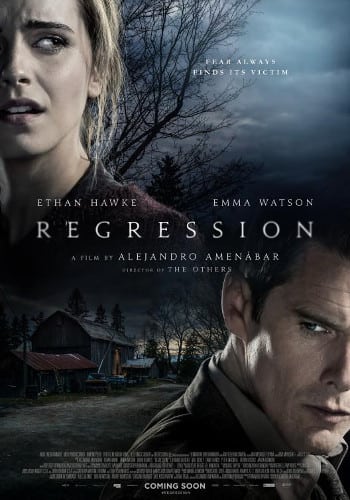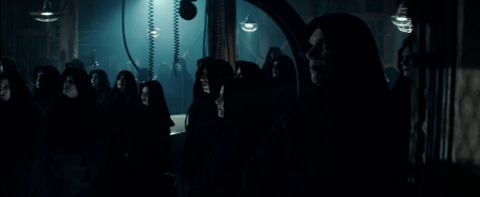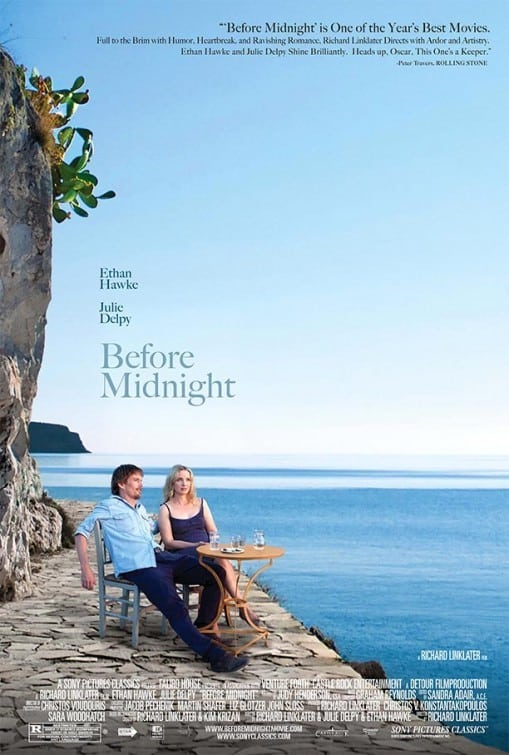Regression (2015)
Directed by: Alejandro Amenábar
Written by: Alejandro Amenábar
Starring: David Thewlis, Devon Bostick, Emma Watson, Ethan Hawke
USA/Canada/Spain
IN CINEMAS NOW
RUNNING TIME: 106 min
REVIEWED BY: Dr Lenera, Official HCF Critic
No-nonsense small town detective Bruce Kenner investigates a strange and disturbing case involving 17-year-old Angela Watson who flees her family home for the local church and writes a letter accusing her father of sexual abuse. When her God-fearing dad John turns up at the station, he says he can’t remember committing the abuse but that he must have done it because Angela says so. Psychologist Kenneth Raines plans to use regression therapy to help Angela and her dad to remember what happened, and this seems to reveal first of all that somebody else committed the abuse, then that a whole satanic coven who commit unspeakable acts is involved….
I’ll admit, I’m rather pleased that, of late, my views about movies seem to be getting more like the general consensus, The Martian and Sicario being two very recent examples of that. I never really want to be so different in my views, though for some time that really did seem to be nearly always the case. Well, I seem to be regressing [sorry, I couldn’t think of a more appropriate word and time is often tight doing all these reviews] with Alejandro Amenabar’s new movie not getting very good write-ups and being something of a flop at the box office. Regression has some problems, largely to do with the telling of its story [I feel that Amenabar’s script could have done with a bit of work on it from somebody else], but within minutes I was gripped by its tense, even disturbing, atmosphere. I guess that for many people the major problem is that it begins as one kind of movie and then turns into something a bit different, while perhaps many would have preferred a more realistic handling of its subject matter like The Crucible [well, it is a brilliant play], but then maybe there are those who feel it doesn’t go far enough on its horror and fantasy. Regression therefore tries to have it both ways and, I freely admit, leaves one feeling a little unsatisfied even if you generally enjoyed the movie like me. However, it tells a very compelling story and is actually a bit scary in parts, even if it’s certainly no Others [Amenabar’s superb ghost story] in that respect.
It takes its inspiration from a wave of Satanic child abuse accusations and actual court cases that swept the world, but especially America, in the 1980s and 90s, but which fizzled out with very little hard evidence emerging and very few convictions. A technique called ‘regression’ was often used which concerned hypnotising people to delve deep into their past [and even their past lives] to provide answers for the current events that were happening and to unlock past occurrences which they may have blocked out. Unfortunately, this often ended up having very bad side effects, though the discrediting of the technique also meant that actual cases of Satanic abuse weren’t always believed. Regression is about when reality and fantasy can collide as a result of people getting certain ideas and sincerely believing of their authenticity. It leads the viewer up the garden path somewhat, but does it very effectively until its supposed stance on the issue [I’m being deliberately vague here, as it seems to me that some reviews of the film give away too much] changes around three quarters of the way through, rather than in the final ten minutes or so, though there is a final revelation that certainly surprised me.
Regression opens very effectively with its beginning titles occurring over some seriously spooky music comprised mostly of a solo voice, strings and what sounds like the sound of running water. Critics seem loath to call Regression a horror film, but to me it’s certainly borderline horror right from the beginning which gives you the impression that you’re going to see something scary. It throws the viewer into its story right away and immediately gets his or her mind wondering. A cop who’s also a friend of the Watson family thinks that Angela is making up, or at least exaggerating, the abuse because her father was a nasty drunk and was very unpleasant to live with, causing her brother to move away and leaving her alone in the house with him and her scary grandmother after her mother died in a car crash. Psychiatrist Kenneth Raines thinks that the abuse was real but when he tries regression on Angela, it reveals, in a rather creepy scene with blurry visuals, that somebody else did the abuse, though John may have still been present. The person doing the act is revealed to us, but that’s only the beginning as further developments reveal the possible existence of a gang of Satanists.
The film really is quite strong for quite a while, largely due to cinematographer Daniel Aranyo’s moody photography, often quite beautiful when showing the many nocturnal car rides in the rain but often helping to create a sense of unclean despair with its emphasis of murky greens and blues, and also the chilling score by Roque Banos who proved his expertise in scoring horror with the Evil Dead remake. The feeling of dread is palpable and, while after a while too much of the film seems to be taken up with either interviews or nightmares, it maintains the suspense quite strongly. The first shot of the painted white faces of the Satanists is quite unnerving and there’s a real evil vibe when Bruce is walking round listening to Angela’s testimony in the place where nasty stuff supposedly happened and he imagines that he’s observing the events she’s talking about. There’s even a decent jump scare involving a cat, though this is one of many moments that end up not making much sense and the script does lose its way a little even if the film remains quite gripping. The screenplay also has someone conveniently reveal something near the end which answers some questions, but you may ask why he didn’t say this right from the offset. The answer is, of course, there would have been no movie otherwise.
It’s sometimes difficult to distinguish what Amenabar is depicting as real and what he’s depicting as fantasy, which seems to be another thing that viewers dislike about this film. It’s true that the weirder moments don’t always fit in, but I myself tend to like it when a film goes a bit ‘off the rails’, as it were. Ethan Hawke’s investigator character becomes something of an unreliable first person narrator but, rather than this meaning that Amenabar has got lost in his story and isn’t sure of what angle to take on it, it can also be seen as refreshingly subversive. The film repeatedly neglects its responsibility to give us a touchstone by which we could judge the accuracy of what we were seeing, but hang on a minute – do films really have this responsibility, and doesn’t muddying the water actually strengthen what Regression is saying about how people can be overcome by delusions and think they are real? There are issues with the story of the film, but actually I think that Amenabar’s approach, despite being often flashy, is more intelligent than it’s generally been given credit for.
Hawke is his usual dour self and Emily Watson creates a lot of sympathy as Angela though her American accent isn’t too convincing. David Thewlis’ psychologist character, replete with Lancashire accent, is somewhat annoying, while Lothaire Bluto, who makes for a slightly creepy priest, looks more like Anthony Perkins with each film. Yes, Regression has its flaws – I forgot to mention a brief fight climax that seems to have been thrown in to provide the viewer with some supposedly exciting climactic action but seems both half-hearted and unnecessary – but it’s really a rather well made and consistently intriguing mystery/horror combo that may leave you a bit disturbed, angry and frustrated – but that’s precisely what it’s trying to do. I guess that one day we’ll get the sober, realistic version of the same subject matter, but Amenabar’s imaginative, perhaps deliberately inconsistent version will definitely do for now. I also personally found it a bit frightening, which is always a good thing in my book and usually overrides things like script deficiancies.
Rating: 

















Be the first to comment